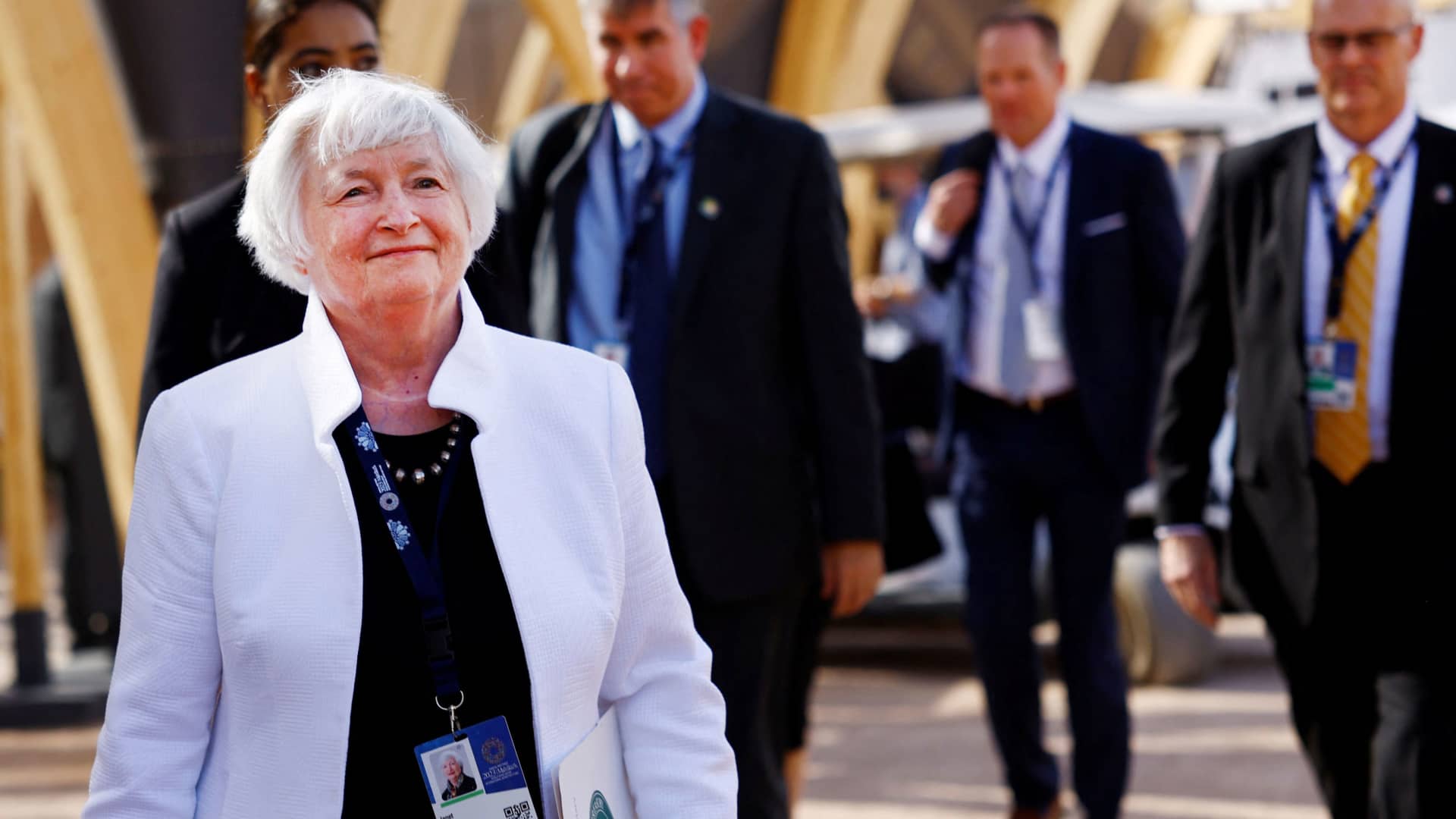U.S. Secretary of Treasury Janet Yellen arrives for a bilateral meeting on the third day of the International Monetary Fund and World Bank annual meeting, in Marrakech, Morocco, October 11, 2023.
Susana Vera | Reuters
Overshadowed by fresh Middle East violence and hosted by a country still recovering from an earthquake, the week-long annual meetings of the International Monetary Fund and World Bank wrapped up on Saturday.
Discussions in the Moroccan city of Marrakech ranged from the prospects for a world economy weighed down by debt, inflation and conflict to the growing wealth gap between rich and poor countries and floundering efforts to tackle climate change.
Here are the main takeaways:
‘Limping economy’
The new IMF outlook – signed off before the escalation of the conflict between Israel and Hamas – sees global economic growth slowing from 3.5% last year to 3% this year and 2.9% next year, a 0.1% point downgrade from a previous 2024 estimate.
Global inflation is seen dropping from 6.9% this year to a still-high 5.8% next. Central bankers signaled readiness to end interest rate hikes if events allow, hopeful that inflation can be finally tamed without too hard a landing.
Most agreed it was too early to say how Middle East strife would affect a global economy which IMF chief economist Pierre-Olivier Gourinchas described as “limping along, not sprinting”.
Debt squeeze
The heavy debt burdens of advanced economies — from the United States to China and Italy — was a recurrent theme in the meetings, which came after financial markets in recent weeks pushed U.S. bond yields higher. Italian central bank governor Ignazio Visco said there was an impression markets were “reevaluating the term premium” as investors become more nervous about holding longer-term debt.
JPMorgan chair of global research Joyce Chang put it another way. “The bond vigilantes are back, and the Great Moderation is over,” she told a panel of the two-decade era of relative economic calm before the 2008/09 financial crisis.
One policy area where this could have a knock-on effect is the fight against climate change. Vitor Gaspar, head of the IMF’s fiscal division, warned current subsidies-based policies were failing to deliver net zero emissions and that scaling them up would explode public debt. “Countries will need a new mix of policies with carbon pricing at the center,” the Fund concluded.
Debt deals and reforms
Looking beyond the major developed economies, higher policy rates, a strong dollar and geopolitical uncertainties are adding to challenges for the rest of the world.
Turkey was in the spotlight as Finance Minister Mehmet Simsek pitched its reform plan. “The biggest structural issue is to bring inflation down. And they’re working on it,” said Murat Ulgen, Global Head of Emerging Markets Research at HSBC.
Kenya is looking to avoid slipping into debt distress and its central bank governor told Reuters it plans a buyback of a quarter of its $2 billion international bond maturing in June – pushing its 2024 bond up 1.2 cents on the dollar.
One debt restructuring deal emerged: Zambia finally agreed a debt rework memorandum of understanding with creditors including China and France.
Progress on Sri Lanka was less clear. Sri Lanka said on Thursday it reached an agreement with the Export-Import Bank of China covering about $4.2 billion of debt, while talks with other official creditors are stalling.
Risks skewed to the downside
High interest rates will put some borrowers in more precarious positions, the IMF warned in its Global Financial Stability Report. Around 5% of banks globally are vulnerable to stress if those rates remain higher for longer, it estimated, and a further 30% of banks — including some of the world’s largest — would be vulnerable if the global economy enters a prolonged period of low growth and high inflation.
Jostling for influence
The Ukraine war, growing trade protectionism and tensions between the United States and China are all making consensus-building tougher: In the end, there was not enough agreement to issue the usual final communique at the end of the meetings.
There was much talk ahead of Marrakech on revamping the IMF and World Bank to better reflect the emergence of economies like China and Brazil. A U.S. proposal to boost IMF lending power but save a review of shareholdings in the fund till later won broad support. A pact announced on Saturday spoke of a “meaningful increase” in quotas by end-2023 but gave few other details. Anti-poverty groups were skeptical of what had been achieved.
“The big theme this week is G-7 countries papering over the cracks of shattered promises,” said Kate Donald, Head of Oxfam International’s Washington, D.C., office. “Despite the wringing of hands about the billions of dollars needed to tackle poverty and climate breakdown, there has been no sign of new money.”





















Discussion about this post